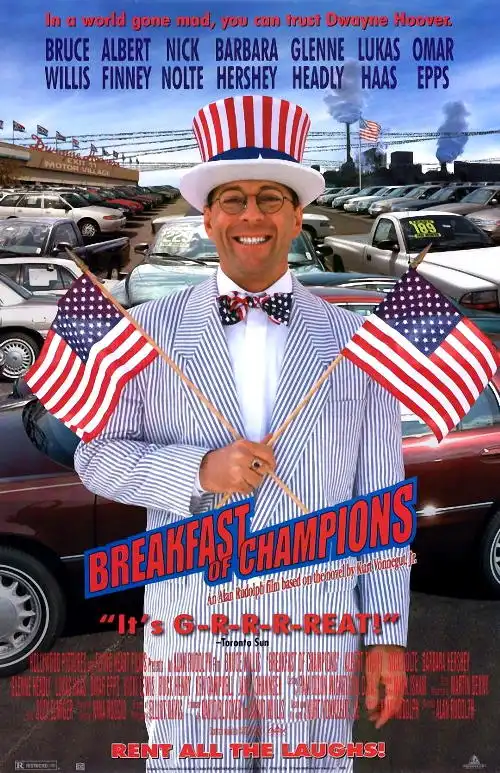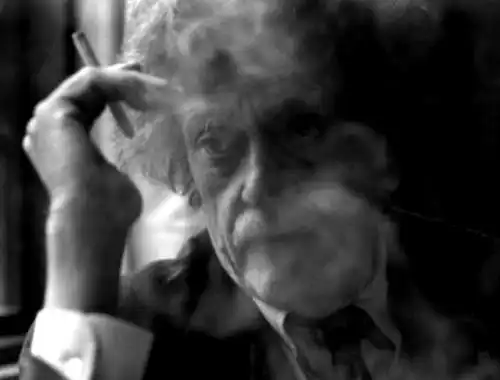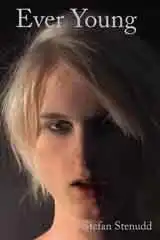Burlesque Breakfast of Champions (1999) Review of the movie, by Stefan Stenudd
The cast was a splendid bunch of actors, so the fault must lie with the director Alan Rudolph. I wonder what Kurt Vonnegut thought about it. He was somewhat involved, even doing a cameo as the role of a commercial director. Did he realize where the movie was heading and if so, did he approve? I doubt it. I read the novel back in the 1970s, when I had a period of passionately indulging in the books of Vonnegut. That reading experience was instrumental in getting me started on my own writing. You all know the feeling: When I opened the cover of a Vonnegut book that was new to me, a tickling sensation went through all my body. Already by reading his pensive preface (and he always had one), I was in heaven. He never disappointed me. Well, not until after Breakfast of Champions, which he wrote as sort of a literary testament, when he was turning fifty, just like Dwayne Hoover, the main character of the book. I read it soon after its release and I had the strong impression that it was to be his last novel, a farewell to the characters he had created as well as to his readers. As it turned out, it was not. He wrote seven more novels before calling it a day. I read the first few of this post-Breakfast suite, and gradually lost interest. Something of the Vonnegut esprit I loved had evaporated. So, I had to start writing my own novels. Yes, the decay of Vonnegut's writing triggered me to start writing my own novels. That I commenced in 1976, the year that the first of his post-Breakfast novels, Slapstick, appeared. Before coming to the conclusion that more needed to be said than what Vonnegut had expressed, I would not dream of trying to contribute. I know, the mind of an author is an odd thing. I've always felt that my writing is nothing but an obligation to all the previous writers and all the coming ones a link in the chain, nothing more and nothing less.
 Kurt Vonnegut, 1922-2007.
Meeting in the NightOh, I actually met Kurt Vonnegut once. In 1980, when I spent some months in New York. In the middle of the night, of course, at a 3rd Avenue take-out sandwich bar, where I was trying to make jolly conversation with the Puerto Rican girl behind the counter, while she was making my BLT.Somebody behind me sighed, as if from the grave, annoyed that I kept the line behind me waiting. I turned around, finding myself staring into the belly of a very tall man. I raised my eyes to his face, way up there. It was Kurt Vonnegut. He looked like the Reaper. The thousands of wrinkles in his face formed an expression of absolute boredom, as if nothing in the universe or beyond it had the least chance of giving solace. As if life was nothing but suffering and I was prolonging the time he had to endure it. I was young and unstoppable, so I still tried to speak with him. He complied minimally and very reluctantly, so the conversation ended quite quickly. I wondered why living would be so painful to one who had inspired so many. But I remembered an earlier discovery of mine: great humor emerges from sad souls.
Everyday AbsurdityWell, back to Breakfast of Champions. The book sure is an absurd comedy, mixed up with naive drawings by the author. But it still has a pensive tone, albeit between the lines. Vonnegut reveals the absurdity of everyday life. When the story is turned into burlesque, this is lost. The world presented in the film is grotesque, so it can say nothing about the world we imagine that we live in. Everything turns into nonsense.Of course, Vonnegut's book is simply black letters (and drawings) on white paper. That alone brings its content down to a low-voiced level. But his writing is also low-keyed, even when seemingly spaced out. It's all about regular folks living their regular lives kind of. When I was watching the movie with all those resourceful actors, I saw an alternative movie in my head toned down, low-key, where the insanity of Dwayne Hoover, as well as the rest of the world, was just slowly emerging. That would be a movie worth watching. One of the things that attracted me to the writing of Kurt Vonnegut was just that. The absurdity and insanity is not something out of the ordinary, but present in our very normal everyday life. It's right here, among us and inside of us all. Overdoing it just hides that fact. I think of Shakespeare's advice to actors, given by Hamlet:
Be not too tame neither, but let your own discretion be your tutor: suit the action to the word, the word to the action; with this special o'erstep not the modesty of nature: for any thing so overdone is from the purpose of playing, whose end, both at the first and now, was and is, to hold, as 'twere, the mirror up to nature; to show virtue her own feature, scorn her own image, and the very age and body of the time his form and pressure. Now this overdone, or come tardy off, though it make the unskilful laugh, cannot but make the judicious grieve; the censure of the which one must in your allowance o'erweigh a whole theatre of others. O, there be players that I have seen play, and heard others praise, and that highly, not to speak it profanely, that, neither having the accent of Christians nor the gait of Christian, pagan, nor man, have so strutted and bellowed that I have thought some of nature's journeymen had made men and not made them well, they imitated humanity so abominably. And let those that play your clowns speak no more than is set down for them; for there be of them that will themselves laugh, to set on some quantity of barren spectators to laugh too; though, in the mean time, some necessary question of the play be then to be considered: that's villanous, and shows a most pitiful ambition in the fool that uses it.
Stefan Stenudd December 17, 2011
Click here for more reviews
About CookiesMy Other WebsitesCREATION MYTHSMyths in general and myths of creation in particular.
TAOISMThe wisdom of Taoism and the Tao Te Ching, its ancient source.
LIFE ENERGYAn encyclopedia of life energy concepts around the world.
QI ENERGY EXERCISESQi (also spelled chi or ki) explained, with exercises to increase it.
I CHINGThe ancient Chinese system of divination and free online reading.
TAROTTarot card meanings in divination and a free online spread.
ASTROLOGYThe complete horoscope chart and how to read it.
MY AMAZON PAGE
MY YOUTUBE AIKIDO
MY YOUTUBE ART
MY FACEBOOK
MY INSTAGRAM
STENUDD PÅ SVENSKA
|
 Ever Young
Ever Young